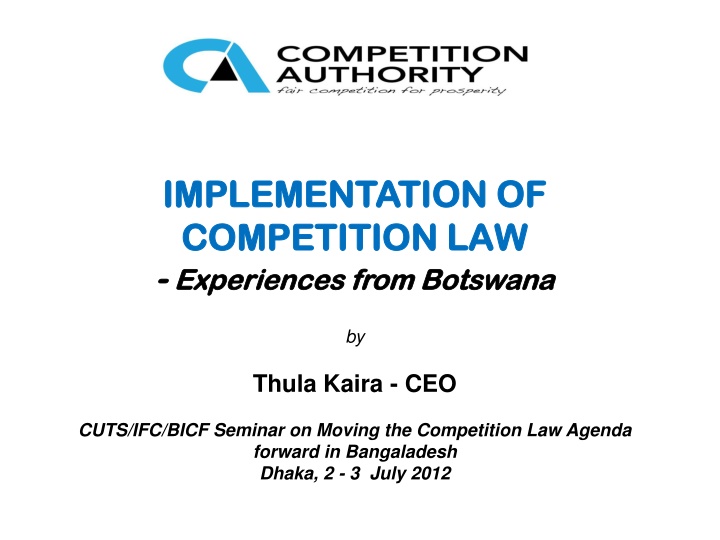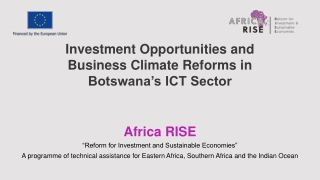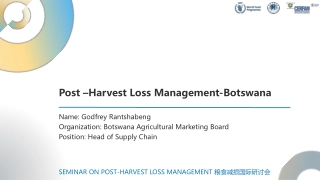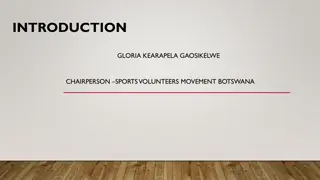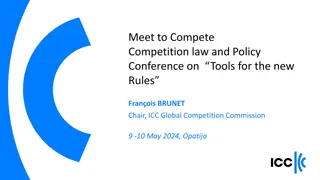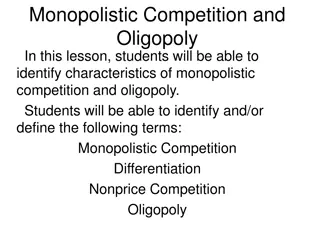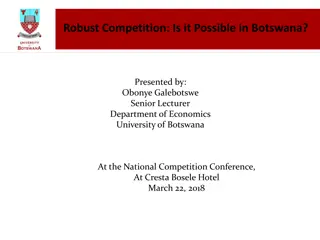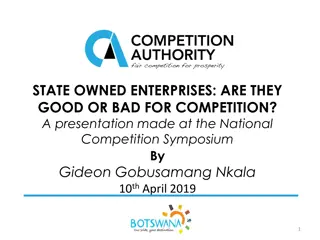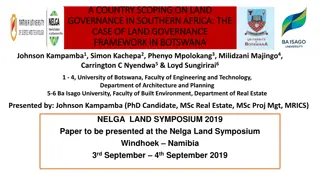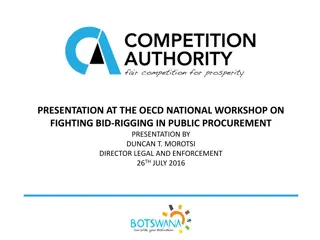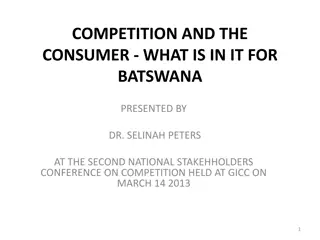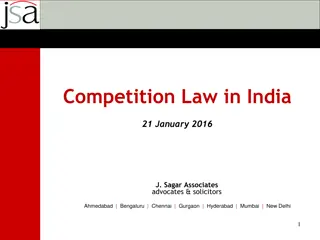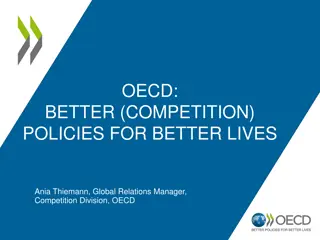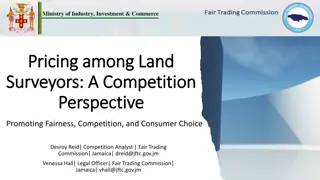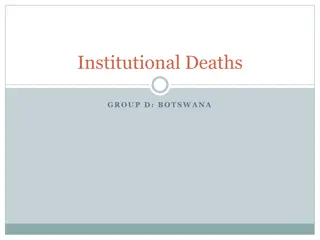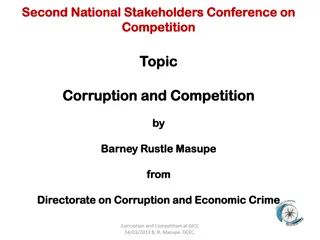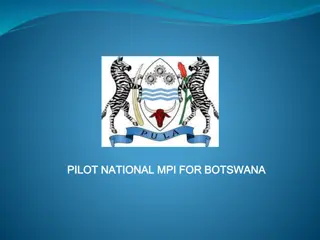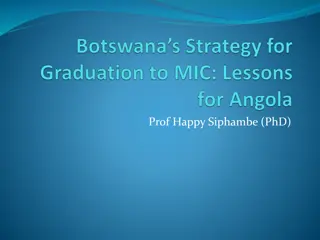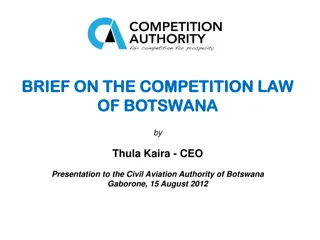Implementation Experiences of Competition Law in Botswana
The implementation of competition law in Botswana through the experiences shared by Thula Kaira. Discover insights on the rationale, independence, and outcomes of competition policy in Botswana, along with a detailed introduction to the National Competition Policy. Learn about the regulations and objectives set forth by the Competition Act of 2009.
Download Presentation

Please find below an Image/Link to download the presentation.
The content on the website is provided AS IS for your information and personal use only. It may not be sold, licensed, or shared on other websites without obtaining consent from the author.If you encounter any issues during the download, it is possible that the publisher has removed the file from their server.
You are allowed to download the files provided on this website for personal or commercial use, subject to the condition that they are used lawfully. All files are the property of their respective owners.
The content on the website is provided AS IS for your information and personal use only. It may not be sold, licensed, or shared on other websites without obtaining consent from the author.
E N D
Presentation Transcript
IMPLEMENTATION OF IMPLEMENTATION OF COMPETITION LAW COMPETITION LAW - - Experiences Experiences from from Botswana Botswana by Thula Kaira - CEO CUTS/IFC/BICF Seminar on Moving the Competition Law Agenda forward in Bangaladesh Dhaka, 2 - 3 July 2012
PRESENTATION OUTLINE 1. Introduction 2. Rationale of Competition Policy and Law 3. Experiences from Botswana 4. Independence/Autonomy 5. Conclusions
1. INTRODUCTION The Policy preceded by an Economic Mapping Survey that noted levels of unemployment, increasing dominance of foreign firms in Botswana s economy The Government of Botswana through its Cabinet adopted the National Competition Policy for Botswana in July 2005
1. INTRODUCTION contd The need to safeguard and promote the growth and development of citizen-owned SMEs; and Other Government policy initiatives such as the diversification of the economy The EMS also highlighted:
1. INTRODUCTION contd Arising from the Policy, the Government through its National Assembly/ Establish the Competition Authority Regulate competition in the economy Outline its mandate Parliament enacted the Competition Act in 2009 whose objectives in its preamble are to:
2. RATIONALE FOR COMPETITION LAW Comp.law controls selfish business gains & consumer exploitation; strives to facilitate broad-based wealth creation by ensuring & provoking open, fair markets e.g questioning contracts reviewing commercial & administrative barriers to domestic trade (just as trade law tries to do the same in intl trade) EG long-term exclusive contracts; IPRs; M&As leading to monopolisation, etc
RATIONALE contd Markets are susceptible to be captured by greedy business entrepreneurs to the detriment of other possible beneficiaries and hence the need for a control system
UN SET of Principles & Rules on Competition States should, at the national level or through regional groupings, adopt, improve and effectively enforce appropriate legislation and implementing judicial and administrative procedures for the control of restrictive business practices, including those of transnational corporations States, in their control of restrictive business practices, should ensure treatment of enterprises which is fair, equitable, on the same basis to all enterprises, and in accordance with established procedures of law. The laws and regulations should be publicly and readily available
3. EXPERIENCES FROM BOTSWANA Botswana is a member of the international community of trading nations and its ability to access foreign markets requires that its firms are competitive. Competition precludes competitiveness (eg SACU FTA, SADC, EPAs ) As Bangaladeshi embarks on a process of developing its law, there is need to identify and maintain a support base for a highly misunderstood, to include: 9
EXPERIENCES contd Technocrats Sector Policy Makers/ Politicians in Govt Regulators CSOs/ Big The Press Business Academia Small Business Consumers 10
EXPERIENCES contd Identification of the friends of competition should ideally follow this order: The Policy Makers (for funding purposes) The technocrats (for regulations to be processed) The media (to begin to understand the concepts) Ultimately, a small business and consumer base is the ultimate power base, but it depends on their proper understanding of the law (hence need for sustained advocacy) 11
EXPERIENCES contd Recognise Govt is the owner of the Competition Policy and Law thus its agents entrusted with implementing this law must take Govt policy into acccount. In Botswana, we have had to: Master Govt developmental vision Play an impartial advisory role (advocacy) to Govt where there may be conflicts with policy Take into account overriding public interests 12
EXPERIENCES contd Guided By Accountable A THE Other over- arching National Policies to Govt through the Minister Govt COMPETITION AUTHORITY IS Agency 13
EXPERIENCES contd WHILE the law may be in the abstract for most people, the effect of the decisions of a CA are usually self-evident (eg where a merger is prevented and loss of jobs occur) theories dont sooth PAIN Developing countries such as Botswana have thus inculcated certain public interest considerations to be taken into account when dealing with competition matters, inter alia: 14
EXPERIENCES contd Maintain lower prices, higher quality or greater choice for consumers Promote or maintain efficient production, distribution or provision of goods & services Advance the strategic or national interest of Botswana in relation to a particular economic activity; Provide social-benefits which outweigh the effects on competition; 15
EXPERIENCES contd Occur within the context of a citizen empowerment initiative of Government; Further other national development programs In this context, we have approved or rejected mergers for instance based on P.I issues The Act also has exemptions (except for cartels) based on P.I considerations 16
EXPERIENCES contd The State has limited the extent of application of the law to sectors where there is a statutory monopoly (& this has to be respected by a CA): Botswana Meat Corporation Botswana Power Company Air Botswana (until recently) Botswana Telecomm. Company (on fixed landline) Botswana Rail 17
EXPERIENCES contd DONT take on everything at once priortise eg: Contract farming arrangements in the agriculture sector Role of middle-men in excessive or predatory pricing of agriculture goods Industries dominated by the same firms (long term view) Protected SOEs 18
4. INDEPENDENCE/AUTONOMY? Court of Appeal High Court Minister of Trade Competition Commission Competition Authority 19
INDEPENDENCEcontd There is need to ensure that the investigation is separated from the adjudication in effect and not just on paper Structural autonomy is relevant where there is a low culture of the rule of law Accountability on use of funds and reporting to Parliament through an Annual Report are important Need to have strict code of conduct CHE GUEVARA: He who receives gifts loses his freedom 20
5. CONCLUSIONS Competition Policy should be carefully handled because it easily attracts well coordinated, connected, resourceful and more powers enemies but weaker and fragmented friends A competition law that does not make sense to policy makers and general citizenry will not be funded Ideal expertise must be attracted, motivated and retained to develop advocacy & enforcement skills Avoid quoting too many theories: 21
JUST DO IT! 22
THANK YOU FOR FURTHER INFORMATION: Thula Kaira - CEO Competition Authority Plot 50664, Fairgrounds Office Park Private Bag 00101 Gaborone, BOTSWANA Tel: +267 393 4278 Fax: +267 312 1013 Thula.Kaira@competitionauthority.co.bw Email: Thula.Kaira@competitionauthority.co.bw Thulasonikaira@yahoo.com Thulasonikaira@yahoo.com FACEBOOK: Competition Authority Botswana Twitter: CompetitionBots
